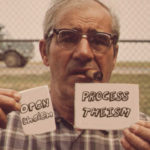We run our website the way we wished the whole internet worked: we provide high quality original content with no ads. We are funded solely by your direct support. Please consider supporting this project.

God’s Regrets and Divine Foreknowledge
One aspect of the portrait of God in Scripture that suggests the future is partly open is the fact that God sometimes regrets how things turn out, even prior decisions that he himself made. For example, in the light of the depravity that characterized humanity prior to the flood, the Bible says that “The Lord was sorry that he made humankind on the earth, and it grieved him to his heart” (Gen 6:6). The genuineness of his regret is evidenced by the fact that the Lord immediately took measures to destroy humanity and start over.
Now, if everything about world history were exhaustively settled and known by God as such before he created the world, God would have known with absolute certainty that humans would come to this wicked state, at just this time, before he created them. But how, then could he authentically regret having made humankind? Doesn’t the fact that God regretted the way things turned out—to the point of starting over—suggest that it wasn’t a foregone conclusion at the time God created human beings that they would fall into this state of wickedness?
Another fascinating example of the Lord’s regret concerns his decision to make Saul king of Israel. Saul had gotten so wicked that the Lord said, “I regret that I made Saul king, for he has turned back from following me” (1 Sam 15:10).
We must wonder if the Lord could truly experience regret for making Saul king if he was absolutely certain that Saul would act the way he did. Could God genuinely confess, “I regret …” if he could in the same breath also proclaim, “I was certain of what Saul would do when I made him king”? I do not see how. Could I genuinely regret, say, purchasing a car because it turned out to run poorly if in fact the car was running exactly as I knew it would when I purchased it? Common sense tells us that we can only regret a decision we made if the decision resulted in an outcome other than what we expected or hoped for when the decision was made.
Some may object that if God regretted a decision he made, he must not be perfectly wise. Wouldn’t God be admitting to making a mistake? Two considerations lead me to answer this question in the negative.
First, it is better to allow Scripture to inform us regarding the nature of divine wisdom than to reinterpret an entire motif in order to square it with our preconceptions of divine wisdom. If God says he regretted a decision, and if Scripture elsewhere tells us that God is perfectly wise, then we should simply conclude that one can be perfectly wise and still regret a decision. Even if this is a mystery to us, it is better to allow the mystery to stand than to assume that we know what God’s wisdom is like and conclude on this basis that God can’t mean what he clearly says.
My second point, however is that in the open view there is little mystery involved in accepting that God can regret his own previous decisions. Once we understand that the future is partly open and that humans are genuinely free, the paradox of how God could experience genuine regret over a decision he made disappears. God made a wise decision because it had the greatest possibility of yielding the best results. God’s decision wasn’t the only variable in this matter, however, there was also the variable of Saul’s will. Saul freely strayed from God’s plan, but that is not God’s fault, nor does it make God’s decision unwise.
—Adapted from God of the Possible, pages 55-57
Category: General
Tags: Divine Foreknowledge, Free Will, God of the Possible, Open Theism, Scripture, Wisdom
Topics: Open Theism
Related Reading

A Calvinist and an Arminian walk into a bar…
Toby Bradbury via Compfight Roger Olson posted A Conversation between a Calvinist and an Arminian about God’s Sovereignty that we thought was dead on. In fact, we kind of wonder if Roger is bugging some of the conversations we’ve had. Déjà vu much? And since Roger has argued that Open Theism should be included under the broader umbrella of…

Warfare Worldview: A Basic Definition
The warfare worldview is based on the conviction that our world is engaged in a cosmic war between a myriad of agents, both human and angelic, that have aligned themselves with either God or Satan. We believe this worldview best reflects the response to evil depicted throughout the Bible. For example, Jesus unequivocally opposed evils…

Process Theology & Open Theism: What’s the Difference?
Question: When ReKnew talks about Open Theism is it a mistake for people to equate it with Process theology, and if so what are the defining differences? I guess I am starting to lean toward Dr. Boyd’s thoughts for all things theologically egg-heady, so I thought I would ask the question. Your ministry has been freeing…

Last Minute Preparations
We’re all busy here at ReKnew making last minute preparations for the Open2013 conference here in St. Paul, MN. It’s our first ever event of this kind and there’s a nervous energy and anticipation. I wonder if you’ll hold this up in prayer if you weren’t able to join us? We have a last minute…

Did God Predestine Judas to Betray Jesus? (podcast)
Greg talks about the role Judas played in the crucifixion of Jesus and speculates about his potential for good. Episode 516 http://traffic.libsyn.com/askgregboyd/Episode_0516.mp3

The Case for Including Open Theism Within Arminianism
Here is an excellent post by my good friend Roger Olson in which he makes the case that Open Theism should be embraced by Arminians as an orthodox, if somewhat non-traditional, form of their faith. In fact, Roger argues (rightly in my opinion) that Open Theism is much closer to the “heart” of Arminianism than…
